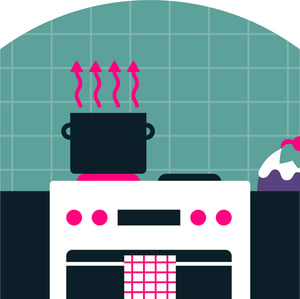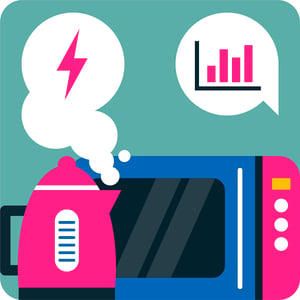How to Reduce Your Cooking Costs: Tips to Improve Your Kitchen Efficiency
Step into your kitchen, a bustling hub of activity where energy consumption often runs high. From ever-running fridges and slow-to-heat ovens, the array of electrical appliances can make this space one of the most energy-demanding areas in your home.
In an era marked by climate concerns and the rising cost of living, the need to save energy has never been more critical. As dedicated energy-saving advocates, we’re here to share our top hacks to improve energy efficiency in the kitchen.
Wasted energy makes up 30% of the average energy bill - do something about it! Get more from your smart meter with Loop.
Ways to Minimise Your Cooking Expenses
Oven
- We know it’s tempting to check on your bakes, but don't open your oven door while cooking! Each time you do, 25 degrees worth of heat is released. Instead, keep your oven door clean to keep an eye on your dishes.
- Be savvy with your oven times! Turn it off 5 minutes before the end of the cooking time and the remaining heat will continue to cook your food.
- Do you know how long your oven takes to preheat? It’s important to find out. Then you can be ready to put your food in straight away!

- Swap glass dishes for metal or ceramic alternatives. They retain heat better, so you can use a slightly lower oven temperature to cook on.
- Start batch cooking! If you’re using your oven, make the most of the energy you’re paying for by filling it up. Prepare extra meals for the week ahead - simply put them in the freezer. Not only is this a great way to reduce food waste and save energy, but you’ll feel super organised too!
Hob
- Use lids on your pans to keep the heat in and reduce the cooking time. It helps water boil faster and uses less energy to heat your food.
- If you have an older electric hob, turn the heat off a couple of minutes before your food is fully cooked. Electric hobs take longer to cool down, so your food will continue to cook even when you turn the ring off.
- Use the correct size hob ring for the pan you’re using. A smaller pan on a large hob ring will use more energy than needed.
- Heating water in a kettle and transferring to a pan uses less energy than heating water directly on the stove. Just make sure to only boil the amount of water you need!
Microwave, Air Fryer and Slow Cooker
- Where possible, swap cooking in your oven for your microwave or air fryer. They use much less energy and cook your food quicker too. Everything from baked potatoes to cakes can be made using a microwave or an air fryer!
- When using your air fryer or microwave (particularly if it's a combination model with oven mode), don’t open the compartments more than necessary! Just like your oven, this lets heat out and wastes energy.

- Don’t forget about your slow cooker! As the name suggests, it cooks food slowly and at a low temperature, which cuts energy costs. Meals in the slow cooker are usually quick to prepare too - just add all your ingredients! A common misconception is that only meat dishes work well, but there are lots of vegetarian recipes and you can even cook cakes!
- When using your air fryer, microwave or slow cooker, switch them off, don’t leave them on standby. This also applies to gadgets and appliances all over your house! They continue to use energy even without you necessarily realising - we call this your ‘Phantom Load’. This wasted energy contributes to around 30% of the average energy bill!
Fridge and Freezer
- Before you put food in the fridge, make sure it has cooled down to room temperature. This means that your fridge won’t need to work as hard to maintain the right temperature.
- To keep your fridge working efficiently, make sure it’s at least two-thirds full at all times. It won’t need to work as hard to keep your food cool. This will save more energy than having an empty fridge, or an overfull fridge - which reduces airflow. If you need to, fill up your fridge by adding jugs of water and ice to your freezer.
.png?width=300&height=300&name=Going%20on%20holiday%202%20(3).png)
- Make sure there is a 10cm gap around your fridge and regularly dust the condenser coils at the back to let heat flow away easily.
- Keep your fridge at 5°C or less and your freezer at -18°C. Many households set their fridges to higher temperatures of 7°C, but this will make food go off sooner.
- We’re all guilty of holding the fridge door open for longer than needed as we try to think of what to cook! But this will affect the inside temperature of your fridge and it will need to work harder to cool it down.
- When was the last time you defrosted your freezer? If you need to think about it, then it might be time! When ice builds up, your freezer works harder to regulate the temperature - especially if there’s ice around the fan.
- Try recipes that require no baking and use your fridge instead! Whether that is a tasty salad or a delicious no-bake cheesecake, avoid switching on the oven and make the most of your fridge.
Choosing the Right Appliances
If you’re looking to make bigger savings in the kitchen, consider upgrading to energy-efficient appliances.
Investing in energy-efficient appliances can provide significant benefits for both the environment and your wallet. They consume less energy, often have a longer lifespan, and may require less maintenance as they're typically higher-quality items.
When you're in the market for a new appliance, check out its energy label. It shows you how much energy the appliance uses compared to similar models. Look for the highest rating on the A-G scale, or A+++ to G scale for older models.
Also, consider the size of the appliance, as different sizes with the same rating could use varying amounts of electricity. Always opt for the product with the best energy rating for the size you need. Read more about this here.
• • •
Cut Your Energy Bill With Loop
Loop is a FREE energy-saving app that links to your smart meter, analyses your energy use and shows you easy ways to save. On average, Loop users cut their energy use by 15%! How much could you save?



-1.jpg)




